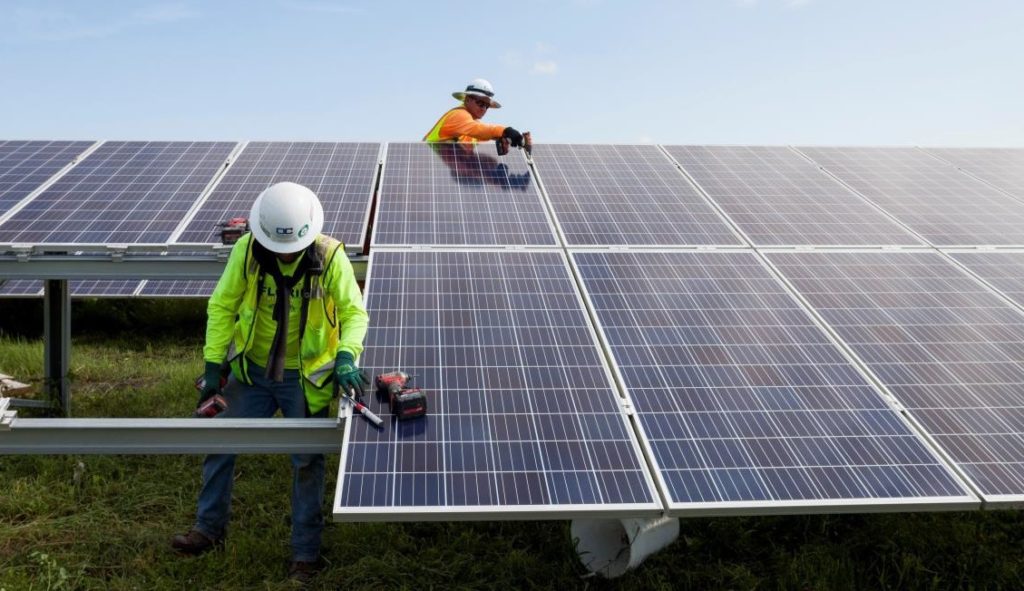
US solar players have hit out at the Department of Commerce’s (DOC) move to investigative alleged circumvention of antidumping and countervailing duties (AD/CVD), warning that the threat of tariffs is already jeopardising President Biden’s climate goals.
In a statement made ahead of Biden’s Earth Day speech today, George Hershman, CEO of utility-scale installer SOLV Energy, said the threat of tariffs “has effectively frozen solar deployment and eliminated the good-paying jobs we need to deliver the President’s climate agenda”.
Unlock unlimited access for 12 whole months of distinctive global analysis
Photovoltaics International is now included.
- Regular insight and analysis of the industry’s biggest developments
- In-depth interviews with the industry’s leading figures
- Unlimited digital access to the PV Tech Power journal catalogue
- Unlimited digital access to the Photovoltaics International journal catalogue
- Access to more than 1,000 technical papers
- Discounts on Solar Media’s portfolio of events, in-person and virtual
Or continue reading this article for free
He added: “If the Biden administration is serious about expanding clean energy to fight climate change, they must reject the reckless tariff petition.”
DOC last month launched the probe into whether crystalline silicon PV cells and modules assembled in Cambodia, Malaysia, Thailand and Vietnam are circumventing US AD/CVD orders on cells and modules from China.
The department’s decision to investigate is having a “severe or devastating impact” on more than 90% of respondents to a Solar Energy Industries Association (SEIA) survey published earlier this month, with three-quarters of surveyed solar companies saying that panel deliveries have been cancelled or delayed.
One developer that is forecasting significant delays just from the threat of the tariffs is NextEra Energy, which expects 2.1 – 2.8GW of 2022 of its solar and storage projects might shift from 2022 to 2023.
This is due to a reluctance from some suppliers to ship panels to the US until the DOC makes a preliminary determination in August.
Talking on a conference call with investors yesterday, NextEra CEO John Ketchum rhetorically asked how the administration could “possibly pull the rug out from under the industry”.
If the DOC does find evidence of circumvention in the current investigation and were to come up with a final determination in January 2023, the tariffs would not be known until the first quarter of 2025, according to NextEra management.
“If you don’t know what the tariff rates are in Southeast Asia, it forces you back to China where the tariffs are known and have been known for the last ten years, which is an absolutely perverse outcome, an outrageous outcome, quite frankly,” Ketchum said.
He added: “It makes absolutely no sense to force business back to China, which is what you were trying to prevent in the first place.”
With the uncertainty from the investigation taking place at a time when natural gas, coal and oil prices have increased dramatically, NextEra CFO Kirk Crews said this has left “solar and storage as one of the few ways to alleviate inflationary pressures on electricity prices”. For that reason, among others, Crews said the company is optimistic that DOC will not impose the duties.
The comments come after trade body the American Clean Power Association released data from a survey earlier this week that found the uncertainty of potential retroactive tariffs is forcing companies to delay or cancel over 24GW of projects and consider laying off 38,000 workers – equivalent to more than a third of the country’s utility-scale solar workforce.
Both SOLV Energy and NextEra management have this week called for progress on the stalled Build Back Better Act.
“Now is the time to move forward on it like no other,” Ketchum said. “Now is the time to create real manufacturing incentives if you want to redomesticate the supply chain to the US.”
Conference call transcript from the Motley Fool.
